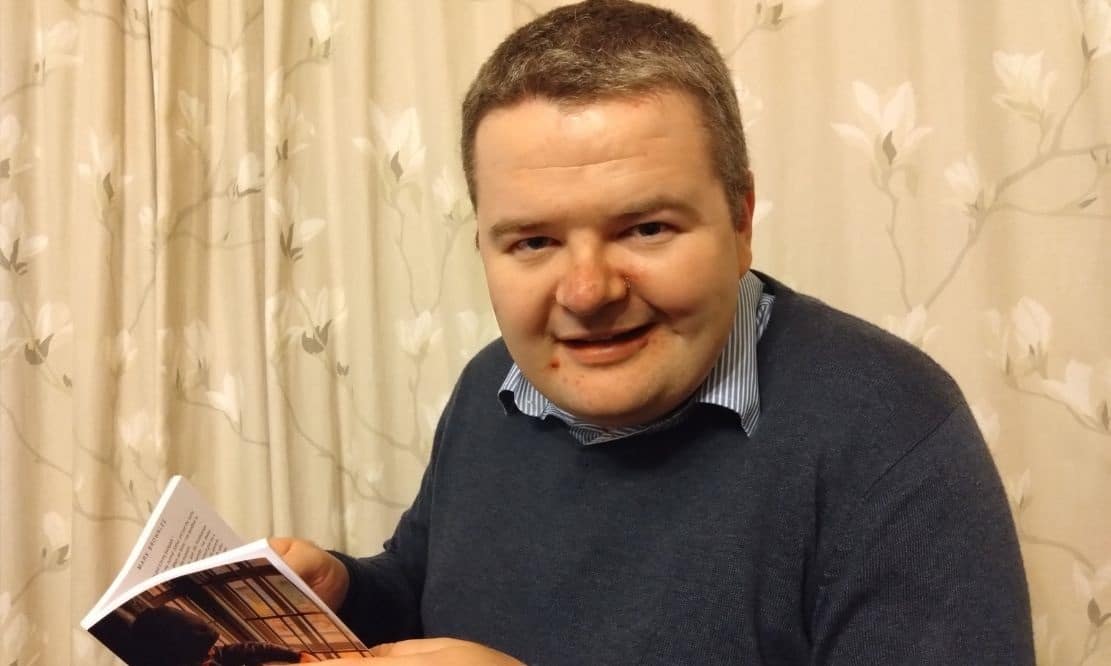
Mark Brownlee is the first to admit he’s had a long journey to get to where he is today.
The Armagh man has navigated years of mental health struggles, including a bipolar disorder diagnosis and a brief stint in the Bluestone Unit at Craigavon Area Hospital.
However, Mark has come through the other side of this challenging ordeal and is today a peer support worker, using his experiences to advise those struggling with their own mental health difficulties.
He’s also a budding author and poet. Alongside a number of open mic performances at the Abbey Lane Theatre, Mark is set to launch his first book ‘Manic’ on November 28, which follows the life of fictional character, Niall Alexander, who struggles with a bipolar affective disorder in a psychiatric hospital.
While fictional, the book is inspired by Mark’s journey and how he used his writing as an escape during the tough periods in his life.
Mark says he has struggled with mental health issues for a long time, having been diagnosed at 15 with mild depression due to GCSE exam stress.
Recounting his mental health difficulties, Mark explained: “I was diagnosed in 2010, when I was about 20, with universal bipolar affective disorder. In 2014, I had a psychotic episode and I was put into Bluestone over the period of Christmas Day 2014 to May 2015. That’s really the period that I use as the basis for the book.”
Mark recalls in that period he had a great deal of paranoia and became heavily fixated on political developments in the world at this time, including the 2014 Charlie Hebdo shootings.
“I was very, very fixated on things and had a lot of paranoia,” he said. “Kind of like someone was going to come and kill me. I actually thought there were going to be terrorists come into the hospital and kill me.”
Mark was eventually placed in Rosebrook, the psychiatric intensive care unit (PICU) of Bluestone.
He admitted: “I was very irate. I wasn’t violent but I was very aggressive and would have been using a lot of aggressive language.
“I suppose because of my mania I almost had a very over-optimistic view of the extent of it because I thought there was nothing wrong with me. I sometimes would have said I’m psychologically sane, sociologically insane.
“It was a strange time, with a lot of paranoia. I was in the PICU for five days and that was very uncomfortable. I was constantly banging on the window asking people to let me out. Obviously I was just so unwell at the time.”
Mark admits that the experience had an effect on his family too, acknowledging that his parents found the experience “very difficult”.
Despite this tough period in his life, Mark vowed to press forward and rebuild. Although it was a “slow process”, he managed to get back into things, doing some volunteer work and smaller jobs here and there.
“It took me several years before I got back to where I got to. I think in both instances when I became unwell, stress would have been the main factor. When I was at university, it was the stress of doing well academically, whereas the second time round it was the stress of being a teacher and I just couldn’t cope with that.
“So perhaps it took just coming out of it, accepting myself for who I am and just coming to terms with what had happened and trying to find something more suitable for me.”
Despite the occasional stint in supply teaching, Mark decided that it wasn’t for him, eventually taking on full-time employment as a peer support worker, a job which he says allows him to use his “lived experience to help others with mental illnesses”.
He explained: “I can say to people that I’ve hallucinated and I’ve heard voices too, so you can use that lived experience. I think people find it very comforting to know that someone else can come alongside them with that experience.
“A lot of people have said to me that it’s very helpful. I have that experience and I’m not afraid to share it. It’s part of my role and they understand that. I’m just coming alongside them and saying I know exactly where they’re coming from.
“I think it can be very empowering for people to see me as somebody who has gone through it and come out the other end. It gives them hope that they can actually then make a recovery as well.”
Alongside his job, Mark has been using his love of poetry, history and literature to help deal with his difficulties.
“I got very into poetry when I was unwell and a lot of people thought that was a characterisation of my illness. A lot of people said, ‘once he’s well again he will stop writing poetry’. I almost thought I would prove them wrong.
“I heard about ‘Open Mics’ pretty much after I got out of hospital and I was pretty quick. It didn’t seem to daunt me at all standing up in front of people. Then I just kept going.
“So I was able to do that very quickly after coming out of Bluestone – just sharing a lot of the poems I wrote in hospital.”
Mark added that his poetry is very often influenced by his mental health journey, recounting a poem that he wrote whilst walking in the Mourne Mountains shortly before his admission to hospital.
“It was kind of a watershed moment because all this stuff was about to happen to me.”
While ‘Manic’ is Mark’s debut novel, he has a number of historical fiction books in the pipeline that he hopes to bring out in the future.
These include historical fiction on the formation of the Orange Order and the United Irishmen.
While Mark hopes to take a break next year, he wants to keep on writing and hopefully publish his history books in the years ahead.
“I’ve always been passionate for history and I’ve always wanted to write about local history. I want to write fiction about local history because all the stuff I’m planning to write about hasn’t been written for fiction.”
While he wants to take a more historical focus, it’s hoped that Mark’s debut novel will shed a light on his experience and his journey thus far.
He added: “I suppose I wrote the first one on mental health because it’s very personal to me. It’s my own story, fictionalised to a certain degree.
“If it does reduce the stigma by writing this book, that’d be great. I’d be happy with that.”






